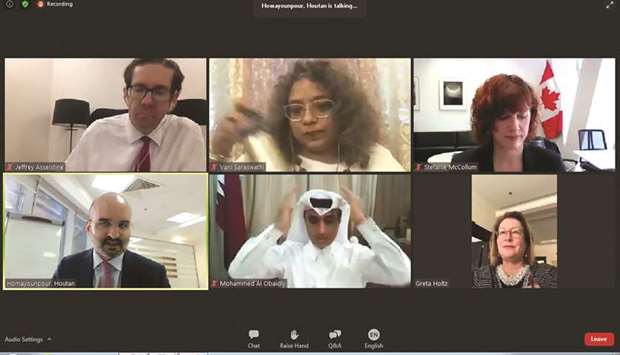A panel discussion highlighted the achievements secured by Qatar in implementing labour reforms, thereby protecting the workers and ensuring their rights.
The discussion was organised by the Canadian embassy. Joining the discussion, Mohamed Hassan al-Obaidly, Assistant Undersecretary for Labour Affairs at the Ministry of Administrative Development, Labour and Social Affairs (MADLSA) said Qatar is the first country in the Gulf Co-operation Council (GCC) that implemented a slew of non-discriminatory laws and reforms including the introduction of a minimum wage system and abolition of the ‘No Objection Certificate’ (NOC) for job change.
“We would like to move towards becoming a better place and supporting workers. The main objective of our plans is to ensure the protection of our workers. This could be achieved through co-operation with international organisations like International Labour Organisation (ILO), trade unions and other countries,” al-Obaidly noted.
He added that MADLSA continues to work to improve “our legislation with its main objective of ensuring a safe work environment in Qatar and attract more migrant labour force and international investment”. “These are carried out as part of the country’s commitment and efforts to ensure human and labour rights,” he said.
The official said that removal of NOC and introducing minimum wages were Qatar’s transition into a new era. “We have now moved into a more competitive market and this will benefit companies and result in the mobility of workers.
An unprecedented effort is taken to ensure a discrimination-free working environment for all. We hope that we will receive the support of the private sector,” he said, thanking Qatar Chamber for its support to the ministry.
He added that MADLSA will support such companies that support the ministry and implement the reforms. “We will collaborate with them to extend services for the employees.”
He said there are a few companies that do not follow the Wage Protection System. “This is not acceptable. Measures will be taken against companies that don’t follow the WPS system. We have a system that helps us detect the violators,” he said.
Regarding human trafficking and absconding, al-Obaidly said measures are in place to bring an end to exploitation. “Some persons have engaged in human trafficking. Measures are in place to prevent human trafficking and ensure action against the lawbreakers,” he said.
He said the ministry is carrying out programmes in tandem with various competent authorities to raise awareness among workers and companies about the law and the reforms.
“We inform companies how to implement the reforms and the law,” he explained, adding that MADLSA has started the classification of companies based on their implementation of labour laws and reforms.
The discussion was also attended by Stefanie McCollum, ambassador of Canada to Qatar and ambassador Greta C Holtz, Chargé d’Affaires at the US embassy in Qatar.

The panel discussion in progress.

